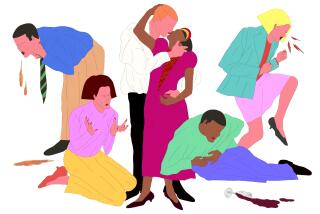Thinking on Your Feet Takes Improvisation--and Practice
- Share via
How do you rate yourself when it comes to thinking on your feet at work? Need a little help in that department? Need a little training? Need a little improv?
Improv? Yes, it’s one of the hottest training methods in today’s workplace--learning the skills used in improvisational theater. See the parallel? Improv actors have to laser-focus so they can create and perform at just about the same instant. Does that sound anything like the demands being put on you in a work world that keeps changing and never shuts down?
What’s more, improv actors have tremendous respect for one another’s concepts and are willing to take someone else’s thread and run with it to see where it goes. And wouldn’t that be nice at work--if colleagues really listened and supported our ideas and gave them a shot, instead of steadfastly proceeding down the same old path?
Respecting other people’s ideas is what it takes to turn a regular old task force into an ensemble, says Robert Lowe, an actor and consultant who has just published “Improvisation Inc.: Harnessing Spontaneity to Engage People and Groups” (Jossey-Bass/Pfeiffer, 2000). It’s the difference between giving the “yes, but” response and the “yes, and” response. “Yes, but” sends a mixed signal--both acceptance and rebuttal, he says, while, “yes, and” acknowledges as well as advances an idea.
And that’s the creed that improv actors live by. Atlanta-based Lowe has been teaching such “improv skills” to managers for 20 years, in workplaces that range from the Metro Atlanta Rapid Transit Authority to AT&T.;
Improv is all about collaboration, communication and connectedness, says Jude Treder-Wolff, a cabaret artist and president of Lifestage, a workplace training company in Smithtown, N.Y. “It teaches you to be more generous and not to be so worried about yourself. . . . Improv calls upon a person’s ability to go beyond the need to be right, look good, play it safe.”
It helps flex our “imaginative and creative muscles,” says Treder-Wolff, whose company designs and conducts experiential, interactive theater programs to help with on-the-job team building, problem solving, stress and diversity.
Besides, who doesn’t need to develop more creativity today? We’re all like balloons, she says--we have the potential to expand--”creativity is to our personality what helium is to a balloon.” And once you’ve been “inflated,” you never quite go back to the same old way of thinking.
More to Read
The biggest entertainment stories
Get our big stories about Hollywood, film, television, music, arts, culture and more right in your inbox as soon as they publish.
You may occasionally receive promotional content from the Los Angeles Times.










